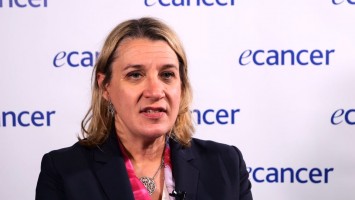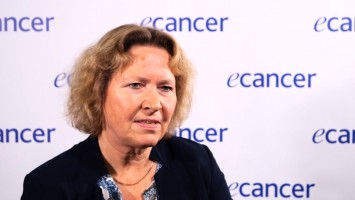ASCO 2010 Annual Meeting, 4—8 June 2010, Chicago
Interview with Professor Heinz Zwierzina (Innsbruck Medical University, Austria)
Biotherapy development association
You’re now in ASCO in Chicago and that’s exciting, but you’re very busy so I won’t keep you long. Thank you for talking with ecancer. Now, you’ve set up a pretty unique initiative called BDA from Innsbruck in Austria, tell us a bit about that.
Well the BDA is the Biotherapy Development Association which was created some eight years ago. It’s actually a spin-off of an EORTC group where we brought together pre-clinical and clinical scientists with the aim to do translational research, to connect a lot of translational research to our early clinical trials. Because the old endpoints of toxicity in phase I, as well as response rate or the response for phase II, are only partially relevant any longer.
So these new drugs, these biologicals or molecular targeted therapies may not be very toxic and to achieve an optimum biologically active dose is much more important than to achieve the maximum tolerated dose. On the other hand, the efficacy is also a problem sometimes because these drugs act as cytostatic and so if a tumour is controlled for a long period of time that maybe achieves the same value for the patient as a clinical response. And this composition of clinical and pre-clinical scientists enables us to do a lot of translational research which is required.
But also in your meetings you make a point of inviting the regulators along and discussing trial design and so on. Does that work? Do they come, do they listen?
Yeah, actually it works very well. Initially we were designed as a group to do early clinical trials but then more and more it turned out that we can provide a platform for all the three parties as well as patient advocacy groups from time to time. So we provide a platform of the regulators, industry and academia and discuss scientific issues as well as pharmaco-economic issues and the prerequisite for us is that all the three parties are always gathered at our meetings.
And you were describing to me a tension between pharma and academia, that there’s not enough money around any more for academics to do academically driven studies and more and more we’re finding in the cancer centres that we’re becoming dependent on sponsorship by pharma. This is a threat that’s real or imaginary?
I absolutely agree. Of course we are also indirectly funded by the industry but we get non-restricted grants and absolutely free in what we do with the money so we can choose the topics we discuss. One planned future meeting is on investigator initiated trials which are key, I think, because although the pharmaceutical industry does lots of very good clinical trials, they of course are market oriented, which is fine, but there must also be a strong academia who do their niche research - clinical trials in rare disorders or combinations the pharmaceutical industry wouldn’t do and the BDA is keen, among other things, to emphasise in the future this approach and set up a network, if possible, in Europe.
So here at ASCO you’ve heard, hasn’t everybody heard, about Ipilimumab. This must be a wonderful lift to your heart, having spent many, many years in translational research in bio and immunotherapy?
Right, immunotherapy is very close to my heart and after these failures of the past ten years – we had a lot of vaccines where very interesting data came out of phase II trials but all these vaccines and immunomodulators were negative in phase III. So this is important, I think, for the community that we have now one drug approved as a tumour vaccine in prostate cancer and now another CTLA4 antibody has shown for the first time in late stage melanoma a survival advantage when patients are treated with it. So this is very important and I guess more financial support will now also come again into the system of meetings running studies as well as meetings on these issues.
Do you think in the immunotherapy area we’ve been too fixated by developing immune approaches targeted to the tumour cells whereas this anti-CTLA4 antibody is actually suppressing the T-cell suppressor, as I understand it? So it’s got nothing to do with the genetic make-up of the tumour cell at all.
Well at the end of the day we are still at the very beginning of understanding all these immunomechanisms. It’s such a complex network and I think from a, so to speak, non-scientific point of view it’s just important that we have one drug or two drugs now that are really active and demonstrated activity. Now the mechanisms are complex and usually when I’m giving talks on that I always mention the example of Herceptin. If we had developed Herceptin in breast cancer, we would have failed but the company was wise enough to develop it in HER2 positive cancers only so there was the target there. But no immunoregulatory drug was ever tested for the target in a broad variety of patients. So it was just the straightforward approach – treat one group with the immunomoderator, the other not, and then see what the outcome is. We need much more mechanistic studies to understand that.
And these two positive results will help us along the way.
I think so, because of course we need the input from the companies to support us, also in academia and I guess that has been a precedent.
Heinz, thank you very much indeed. I appreciate it.








